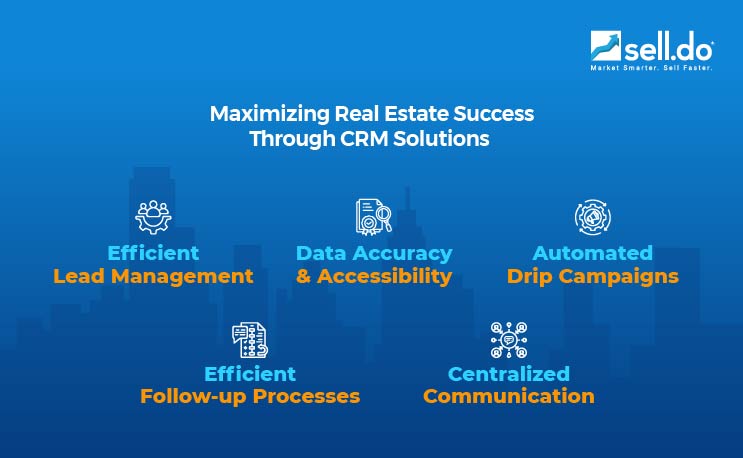Introduction:
In the real estate industry, where transactions are significant and relationships are key, the ability to efficiently manage customer interactions and data is paramount. Real estate professionals face the challenge of not only attracting new clients but also retaining existing ones in a competitive market. Effective management of these relationships often determines whether a real estate business thrives or falters. This is where Customer Relationship Management (CRM) systems come into play, serving as an indispensable tool for modern real estate agencies.
CRM technology has evolved significantly over the years, becoming more sophisticated and integral to business operations across various sectors, with real estate being one of the most impacted. In this sector, CRM systems do much more than just manage contacts. They provide a strategic framework for streamlining operations, deepening client relationships, and boosting sales performance through enhanced data insights and automation.
CRM systems in real estate help firms manage detailed interactions with clients, track property listings, monitor agent performance, and refine marketing strategies—all in real-time. This comprehensive approach to managing client relations is critical in today’s digital age, where personalized service and quick response times are expected.
By integrating CRM solutions, real estate professionals can ensure a more organized, proactive, and efficient approach to customer management. The systems are designed to handle the complexities of real estate transactions, from initial contact through to closing, and even beyond into post-sale follow-up and client retention strategies. This lifecycle management is crucial for building trust and loyalty, which are the bedrock of successful long-term client relationships in real estate.
Maximizing Real Estate Success Through CRM Solutions

-
Efficient Lead Management:
Real estate is a numbers game where the volume of leads can be overwhelming. CRM systems help agents to efficiently manage these leads by categorizing them based on various criteria such as interest level, potential buying power, preferred locations, and more. This segmentation allows agents to apply focused strategies that are tailored to each group, enhancing the likelihood of conversion. For example, high-potential leads can be nurtured with more personalized follow-ups and exclusive property showings, while those in earlier stages of decision-making receive automated updates that keep them engaged and informed.
-
Data Accuracy and Accessibility:
CRMs serve as the backbone for data management in real estate operations. With features that allow for the central storage of detailed client profiles, transaction histories, and communication logs, these systems ensure that information is always current and correct. This reliability is vital when agents need to access historical data for repeat clients or when teams need to share information to provide seamless service. The easy accessibility of data also helps in quickly responding to client inquiries, preparing for meetings or viewings, and ensuring that everyone in the firm is aligned with the client's needs and status.
-
Automated Drip Campaigns:
Drip campaigns are a cornerstone of effective digital marketing strategies in real estate, and CRMs automate this process beautifully. These campaigns allow agents to schedule a series of emails or messages that guide potential clients through the buying process. Each communication is triggered by specific actions taken by the prospect, such as visiting a website or inquiring about a property, ensuring that the content is relevant and timely. Automated drip campaigns help maintain a constant stream of communication with minimal effort, keeping the agency’s brand in the forefront of clients’ minds.
-
Efficient Follow-up Processes:
The role of CRM in real estate is pivotal in enhancing follow-up processes. The system can automatically generate tasks and reminders for follow-ups, ensuring that agents contact leads at critical times. Whether it's a reminder to send a thank you note after a showing or to check in with a client who's been silent for a while, CRM systems make sure that no opportunity for engagement is missed. This meticulous attention to follow-up not only improves client satisfaction but also increases the chances of closing deals.
-
Centralized Communication:
CRM systems consolidate all modes of communication into one platform, enabling real estate professionals to track their complete interaction history with clients. This feature is invaluable for teams where multiple agents might interact with the same client. Centralized communication ensures that there is no miscommunication or duplication of effort, and that every agent has the full context before any interaction. This consistency in communication is crucial for building trust and rapport with clients.
-
Performance Tracking and Analytics:
CRM benefits for real estate agents are significantly amplified by their ability to track and analyze performance. CRM analytics provide deep insights into various aspects of the business, from individual agent performance to the effectiveness of marketing campaigns. This data helps leaders make informed decisions about where to invest resources, how to structure training programs, and which markets to focus on. Analytics also allow agents to refine their sales strategies based on real-time feedback, adapting to market conditions and client preferences.
Conclusion:
Implementing a CRM system in a real estate business brings many benefits, from improved client management and better data handling to more effective marketing and enhanced decision-making. Sell.Do stands out as one of the best CRM for real estate in India, offering tailored solutions that cater to the unique challenges of the Indian real estate market. The Benefits of CRM in real estate for customer retention are clear and substantial. With its ability to manage vast amounts of data and automate numerous processes, CRM is not just a tool but a strategic asset that can propel a real estate business to new heights of efficiency and success.
In conclusion, as the real estate industry continues to evolve, the integration of advanced CRM systems like Sell.Do will play a crucial role in shaping the future of real estate businesses, ensuring they remain competitive and responsive to the needs of their clients. Whether you are looking to enhance client satisfaction, boost operational efficiency, or drive business growth, CRM systems provide the necessary capabilities to achieve these goals effectively.





Leave a comment
Comments (0)
Be the first one to comment.